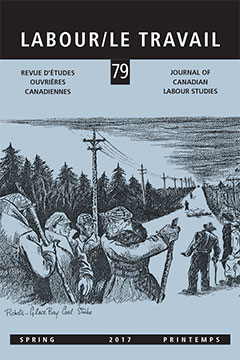Published 2017-05-11
How to Cite
Abstract
The Hunters’ Lodge was a secretive, grassroots American social movement that arose during the Patriot War in support of the Canadian Rebellions of 1837–38. However, despite the large number of participants, we know little about those who took part. This article decentres the military narratives that dominate the existing historiography by providing a collective cultural biography (or prosopography) of the Lodge’s leadership elected in September 1838 at a Patriot Congress in Cleveland. An examination of the life trajectories of these men indicates their shared prewar participation in three related social movements: freethought, free banking, and Freemasonry. A closer cultural examination of the development and intersection of these movements reveals common ties within the Hunters’ Lodge to Owenite utopian socialism as it moved from its communitarian phase to its involvement with an emerging American labour movement. These ties would place the Patriot War participants at the far left of the Democratic Party and in opposition to the concentration of land, wealth, and political power in the developing evangelical-antimasonic-Whig alliance in the aftermath of the financial panic of 1837.
La Loge des chasseurs était un mouvement social américain basique et secret, qui s’est manifesté pendant la guerre des patriotes en soutien aux rébellions canadiennes de 1837-1838. Cependant, malgré le grand nombre de participants, nous connaissons peu de choses sur ceux qui ont participé. Cet article décentre les récits militaires qui dominent l’historiographie existante en fournissant une biographie culturelle collective (ou prosopographie) des dirigeants de la Loge élus en septembre 1838 lors d’un congrès des patriotes à Cleveland. Un examen des trajectoires de vie de ces hommes indique leur participation partagée avant la guerre dans trois mouvements sociaux apparentés : la libre pensée, la banque libre et la franc-maçonnerie. Un examen culturel plus approfondi du développement et de l’intersection de ces mouvements révèle des liens communs au sein de la Loge des chasseurs au socialisme utopique Owenite, lorsqu’il est passé de sa phase communautaire à sa participation à un mouvement ouvrier américain émergeant. Ces liens placeraient les participants à la guerre patriotique à l’extrême gauche du Parti démocratique et à l’encontre de la concentration de la terre, de la richesse et du pouvoir politique dans l’alliance évangélique-antimaçonnique-whig au lendemain de la panique financière de 1837.
